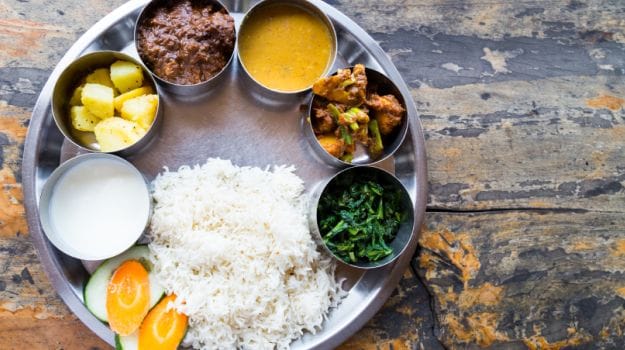Cultivating healthy eating habits is essential for maintaining a healthy body weight and the ancient Indian sciences of Ayurveda has some principles pertaining to just that. Ayurveda is an ancient system of medicine that goes back 4000 years. It believes in maintaining the balance of bodily system through diet, natural herbs and some yogic practices. The west too has started showing immense interest in the Ayurvedic practices recently.A lot of these Ayurvedic practices are being studied in labs across the world and many of these practices have been shown to have scientific backing too. An ideal Ayurvedic diet talks about many eating habits that have the potential to cure so many of our modern and urban woes. Choosing foods according to your constitution, paying attention to food and eating as per your capacity are some of the Ayurvedic eating habits that could bring about a great deal of change in your overall well-being.
Here Are Some Good Ayurvedic Eating Habits That You Should Incorporate Today:
1. Do Not Stand And Drink Water
When it comes to healthy eating habits, this one is perhaps one of the most important ones. You should avoid drinking and eating food while standing. It is believed that by standing and drinking, you disrupt the balance of fluids in the body, which may lead to a greater accumulation of fluids in the joints causing arthritis. Drinking water in a standing position also tends to negatively hamper your kidneys. According to Ayurveda expert, Dr. Dhanvantri Tyagi, the Rig Vedas do mention postures; however, it is ambiguous. In the science of Ayurveda, "this particular clause is not explicitly mentioned. It is more to do with the fact that any food item must be eaten slowly. Eating slowly facilitates the digestion process and the same is true for water."
(Also Read: 7 Ayurvedic Tips to Drink Water that You Didn't Know!)

You should avoid drinking and eating food while standing.
2. Eat Foods According To Season
Always choose foods according to season, is an oft repeated advice, which is a great healthy eating habit to inculcate in your life. Foods like gur(jaggery) and ghee are warm in nature, and hence, they are best consumed in winters. On the other hand, curd is of cooling nature. If eaten in winters they may aggravate cold by increasing mucous in your throat. Always consume fruits that are in season. In order to have a healthy mind and body, it is imperative to follow good eating habits.
(Also Read: Why Are We Always Told to Eat Seasonal Food?)

Eat more vegetables that are in season
3. Do Not Overeat, Or Eat Right After A Full Meal: You must know where to stop and never eat without real hunger. Try to opt for light satvik food. Satvik diet places emphasis on seasonal foods, fruits, vegetables, dairy products, nuts, seeds, oils and ripe vegetables. Eating satvik food once in a while helps cleanse your body of the toxins you accumulate from pollutants in the environment and the junk you eat outside. Healthy eating habits can make you feel active from within.
(Also Read: Here's What The Ancient Practice Of Sprinkling Water Around Food Meant!)

You must know where to stop and never eat without real hunger
4. No Distracted Eating: Do not watch TV, phones or read newspapers while you are eating. According to Ayurveda, you are living because you have food on your plate; therefore, it should be shown utmost respect. Distracting environment diminishes your body's ability to digest what you have eaten.
5. Eat Slowly: Do not gobble your food, eat slowly. Chew your food well. This enables better breakdown of food, and also gives time for the digestive enzymes in your mouth to do their work properly. If your food is not digested well, it may lead to a host of digestive woes, tummy problems and even weight gain.

6. Start Your Day With Warm Water: Starting the day with a glass of lukewarm water is an ancient Ayurvedic practice that is gaining recognition in the west too. Drinking warm water raises your body's temperature, which speeds up the metabolism and aid weight loss too.
7. Sit Down And Eat Your Meals: Always make sure you are sitting while eating. Ayurveda expert and Manager of clinical operations at Shree Baidyanath Ayurveda Bhawan, Dr. Ashutosh Gautam, says, "Distracted eating is a big no-no in Ayurveda; one must chew their food properly. Leave all your stress and commitment aside and eat their food. Sitting down ensures you are little less distracted and draws more of your attention towards what is plated. Several experts have also claimed that when you are sitting and eating, your posture is ideal for smooth digestion and keep gastric problems at bay". Ayurveda expert, Dr. Dhanvantri Tyagi, also shares, "Eating in a proper sit-down arrangement is a way of showing respect to the food. There is also a concept of 'sukoon' that is very important in Ayurvedic dietary practice. Sukoon roughly translates to happiness, contentment and satisfaction, all of which is possible when you sit and eat."
8. Ignite Digestive Fire: Many a times you are not hungry because your digestive fire is diminished. Consume a teaspoon of fresh grated ginger with few drops of lime and a pinch of salt. All these ingredients help in activating the salivary glands to produce the necessary digestive enzymes that help in the digestion and absorption of the food you eat.
9. Do Not Pair Foods Aimlessly: "According to Ayurveda, certain food combinations disturb the normal functioning of gastric fire and upset the balance of doshas and lead to problems like indigestion, fermentation, putrefaction and gas formation," notes the 'The Complete Book of Ayurvedic Home Remedies By Dr. Vasant Lad. Some of the incompatible combinations mentioned by the book are milk-banana, yogurt and sour fruits, eggs-milk and honey-ghee.

According to Ayurveda, certain food combinations disturb the normal functioning of gastric fire
Make note of these points and practice them regularly. Do let us know how they are working for you in our comments section below.
About Sushmita SenguptaSharing a strong penchant for food, Sushmita loves all things good, cheesy and greasy. Her other favourite pastime activities other than discussing food includes, reading, watching movies and binge-watching TV shows.










